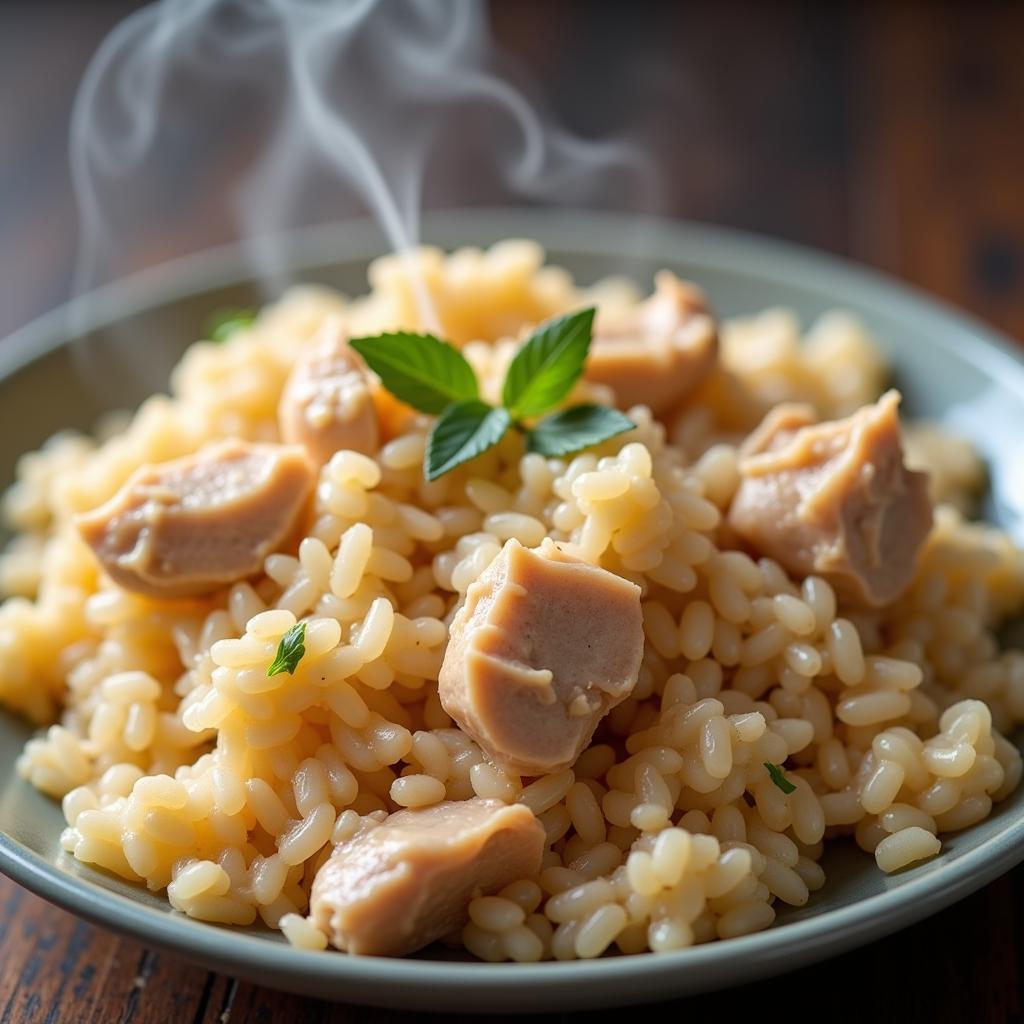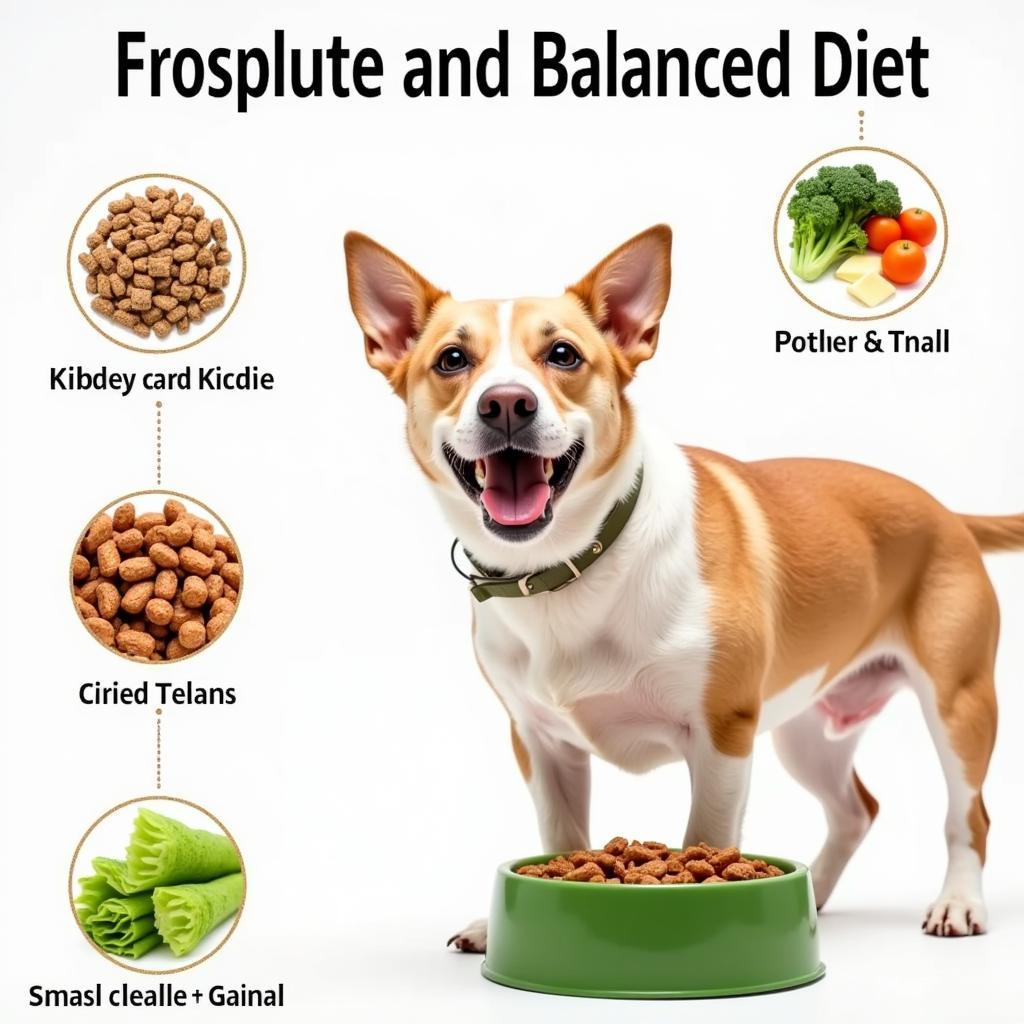Chicken And Rice Dog Food Diet is a common recommendation for dogs with digestive upset. This simple combination is often touted for its blandness and digestibility, making it a seemingly ideal choice for soothing sensitive stomachs. But is it a complete and balanced diet for your furry friend in the long term? Let’s delve into the world of chicken and rice for dogs and explore its benefits, risks, and best practices. After reading this, you’ll have a better understanding of when this diet is appropriate, and when it’s time to consider other options, such as those offered in our reviews on pallets dog food.
Understanding the Chicken and Rice Dog Food Diet
Why is the chicken and rice dog food diet so popular? It’s often prescribed by veterinarians for short-term dietary management of gastrointestinal issues. Both chicken and rice are easily digestible, providing a gentle source of energy and nutrients for dogs experiencing vomiting or diarrhea. This diet minimizes the workload on the digestive system, allowing it to recover. The simplicity of chicken and rice also means it’s less likely to contain ingredients that might exacerbate existing sensitivities.
Benefits of Chicken and Rice for Dogs
A chicken and rice diet can offer several benefits for dogs with tummy troubles. The bland nature of these ingredients makes them easily digestible, even for sensitive stomachs. Chicken provides a good source of lean protein, while rice offers carbohydrates for energy. This combination can help firm up stool and reduce vomiting. However, keep in mind that this is not a balanced long-term solution and shouldn’t replace a complete and balanced commercial dog food like the options discussed in our Purina Pro Plan vs Blue Buffalo Dog Food comparison.
 Chicken and Rice for Dogs with Upset Stomach
Chicken and Rice for Dogs with Upset Stomach
Risks of a Long-Term Chicken and Rice Diet
While chicken and rice can be beneficial in the short term, long-term feeding can lead to nutritional deficiencies. A diet solely based on chicken and rice lacks essential vitamins, minerals, and fatty acids that dogs need for optimal health. This can result in weakened immunity, skin problems, and other health issues. Just like choosing the right breed-specific food, like what we recommend in our article on the best food for Portuguese Water Dog, a balanced diet is crucial for all dogs.
Preparing Chicken and Rice for Your Dog
If your veterinarian recommends a chicken and rice diet, proper preparation is key. Use boneless, skinless chicken breast and boil it until cooked through. Avoid adding seasonings or spices, as these can irritate a dog’s digestive system. Cook plain white rice until soft. The ratio of chicken to rice is generally recommended to be 2:1.
How Long Should You Feed Chicken and Rice?
The duration of a chicken and rice diet should be determined by your veterinarian. Typically, it’s recommended for a few days to a week to allow the digestive system to recover. If symptoms persist beyond this period, consult your vet. You might need to explore alternative dietary options, such as specialized dog food brands discussed on our site, including ranch hound dog food atwoods.
Transitioning Back to Regular Dog Food
Once your dog’s digestive issues have subsided, it’s important to gradually transition back to their regular dog food. Start by mixing small amounts of their regular food with the chicken and rice. Slowly increase the proportion of regular food over several days until they are fully transitioned. This gradual approach helps prevent further digestive upset.
Alternatives to Chicken and Rice
While chicken and rice are common recommendations, there are other bland diet options available. These include boiled turkey and sweet potato, or commercially available prescription diets formulated for digestive health. Consult with your veterinarian to determine the best option for your dog’s individual needs. For example, if you’re considering purchasing dog food in bulk, our guide on dry dog food lamb might be helpful.
 Dog Enjoying a Healthy Meal
Dog Enjoying a Healthy Meal
Conclusion
The chicken and rice dog food diet can be a helpful short-term solution for digestive issues in dogs. However, it is crucial to remember that it’s not nutritionally complete for long-term feeding. Always consult with your veterinarian before making any dietary changes for your dog. They can help determine the best course of action and ensure your furry friend receives the proper nutrition they need to thrive. Remember, a balanced diet is key to a healthy and happy dog.
FAQ
-
Can I add vegetables to the chicken and rice diet?
It’s best to stick to plain chicken and rice while addressing digestive upset. -
What type of rice should I use?
Plain white rice is recommended. -
How much chicken and rice should I feed my dog?
Consult your vet for portion recommendations based on your dog’s size and breed. -
Can puppies eat chicken and rice?
Yes, but only under veterinary supervision. -
What if my dog doesn’t improve on chicken and rice?
Consult your vet immediately. -
Are there any alternatives to chicken?
Boiled turkey can be a good alternative. -
Can I use brown rice instead of white rice?
White rice is generally preferred for its digestibility.
Common Scenarios and Questions
- My dog has been vomiting and has diarrhea. Should I try chicken and rice? Consult your vet first for a proper diagnosis and recommendations.
- My dog has allergies. Is chicken and rice a good option? Chicken allergies are common in dogs, so discuss alternatives with your vet.
Further Reading
For more information on dog nutrition and dietary options, explore other articles on our website.
If you need further assistance, please contact us: Phone: 02437655121, Email: minacones@gmail.com. You can also visit us at 3PGH+8R9, ĐT70A, thôn Trung, Bắc Từ Liêm, Hà Nội, Việt Nam. We have a 24/7 customer support team.